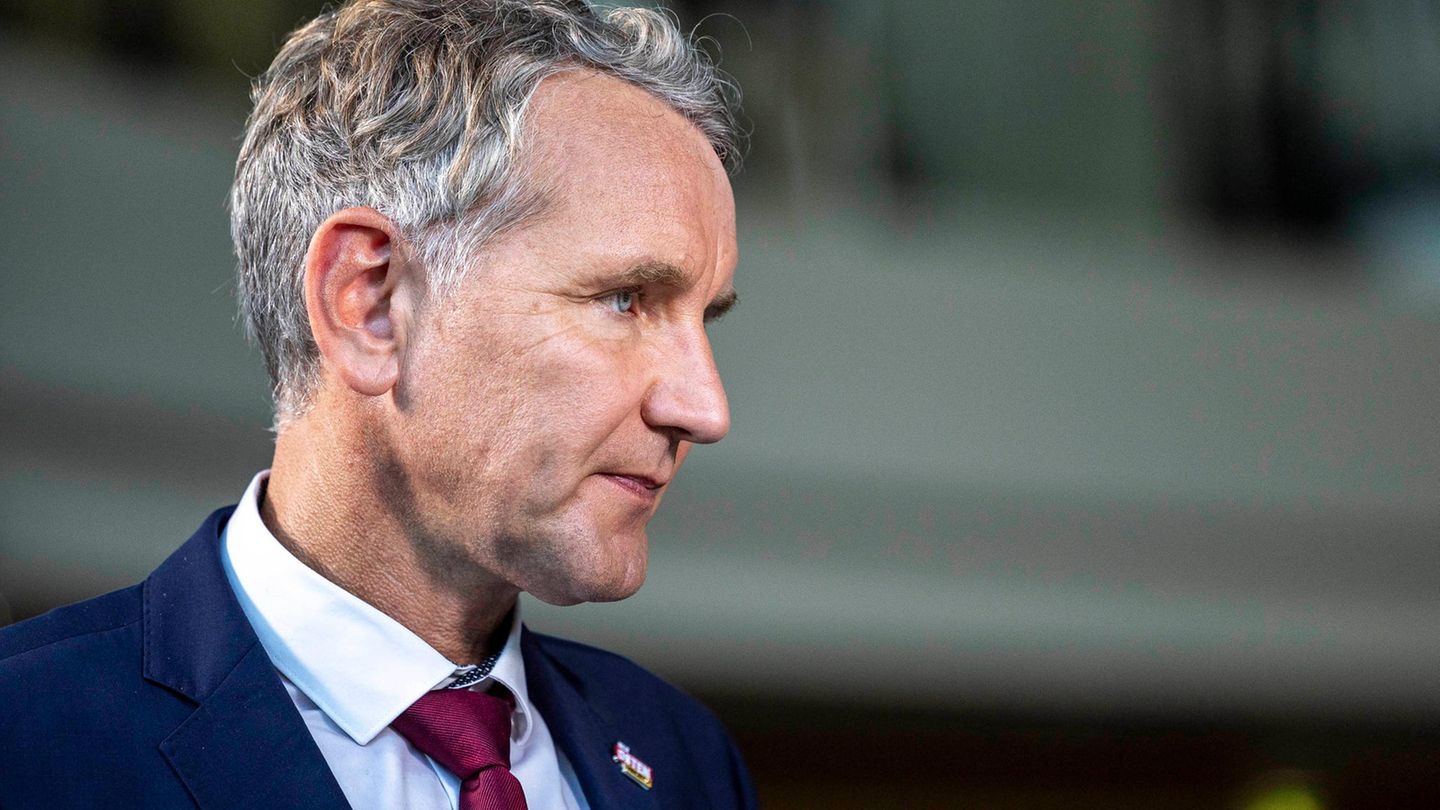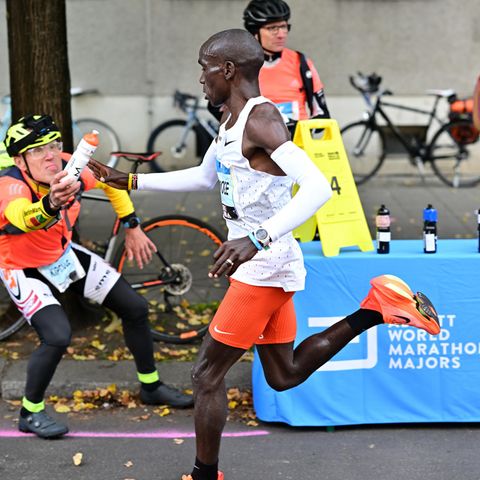After the Kemmerich crisis and the minority government, Thuringia is once again facing a stress test. Thanks to the AfD. Once again, anything seems possible in Erfurt.
In recent years, a number of interesting terms have been coined for the state of Thuringia: political laboratory, experimental field, test case. Only here did a left-wing prime minister, Bodo Ramelow, come to office, the AfD elected the FDP head of government Thomas Kemmerich, and the CDU under Mario Voigt de facto tolerated a red-red-green minority government.
But it gets even crazier. Now the AfD, led by Björn Höcke, is not only the strongest faction in the state parliament and thus has the right to propose candidates in the election of the state parliament president. With 32 of 88 seats, it also has a so-called blocking minority: it can block anything that requires a two-thirds majority – and that’s quite a lot.
On the other hand, the situation in Thuringia continues. This means that no majority can be formed beyond the AfD and the Left. Because nobody wants to work with Höcke’s party and the CDU sees itself as formally bound to its decision to separate itself from the Left, it is again almost impossible to form a majority government.
Instead, there is a stalemate: 44 MPs from the CDU, BSW and SPD are facing 44 MPs from the AfD and the Left Party. This means that anything is possible: from a completely new government construct to complete chaos, which is what Björn Höcke and his party are just waiting for.
But first things first.
Test 1: Election of the President of the State Parliament – AfD or not AfD?
The first test in the newly renovated Thuringian political laboratory will be the election of the President of the State Parliament. The parliament must be constituted by October 1st. And without a president, it cannot work. The rules of procedure of the State Parliament and the associated agreements in the Council of Elders grant the largest faction the sole right to propose candidates in the first and second rounds of voting. And this faction is the AfD.
If the candidate does not receive a majority of the votes cast in a secret ballot in both rounds, the list of candidates can be opened. Then only the rules of the state constitution apply, which states that the state parliament elects a president “from among its members” and that each representative is solely responsible to his or her own conscience.
The state leaders of the three potential governing parties – Mario Voigt (CDU), Katja Wolf (BSW) and Georg Maier (SPD) – agree that they do not want an AfD president. The question for Voigt and Wolf, however, is whether all the members of their factions see it the same way. CDU member Martina Schweinsburg had already expressed his support in star open to an AfD candidate. And the BSW faction is difficult to predict anyway.
However, an anti-AfD alliance can also rely on the Left with its twelve MPs. This includes current Prime Minister Ramelow, who has been warning loudly about a right-wing extremist parliamentary leader. Of course, it will not be easy to agree on a common alternative candidate.
If the AfD were to ultimately win the election, it would be a bigger coup than the Kemmerich election. Because a state parliament president is not only the state’s number one in terms of protocol. He heads the associated administration, has great decision-making power in many parliamentary procedures – and leads the vote on the new prime minister.
Test 2: Coalition formation – something without AfD
This election, which will also be held in secret, is the second major test for Thuringia. It is currently completely unclear whether a coalition of CDU, BSW and SPD will be formed. Voigt wants to meet Wolf and Maier this week to discuss an alliance.
At the same time, the three state leaders are talking with current Prime Minister Ramelow. Formally, the aim is for the state government, which will remain in office in an acting and indefinite capacity until a new Prime Minister is elected, to prepare a state budget for next year. But of course the election of the State Parliament President and possible support from the Left in forming a government will also be discussed.
Ramelow has already indirectly declared his willingness to elect Voigt as prime minister, while Left Party state leader Ulrike Grosse-Röthig is trying to drive up the price: A red-red-red minority government under Wolf with CDU tolerance is also possible, she said.
The result of this tactical confusion could be that the Left collectively abstains, allowing the Christian Democrats a relative majority only in the third round of voting. This is what the CDU did in March 2020 after the Kemmerich crisis when Ramelow was re-elected.
Sahra Wagenknecht will be a disruptive factor in the talks. The BSW federal chairwoman has already publicly invited herself because she fears a coalition that would jeopardize her populist course in Berlin and thus her success in the federal election next year.
BSW state leader Wolf, on the other hand, would prefer to keep Wagenknecht out of the exploratory talks; she prefers an informal conversation between the party founder, herself and Voigt. The main focus will be on how the federal political conditions can be met. For example, the new state government should position itself against the war in Ukraine and the stationing of US missiles. It remains uncertain whether Wolf can emancipate herself from Wagenknecht. The decisive factor will be the extent to which she can keep her faction together, especially since Wagenknecht is notorious for her volte-faces.
In the end, however, it should be enough for a relative majority for the CDU against a likely AfD candidate. If Voigt becomes Prime Minister, his state party will have achieved its main goal: it will once again sit in the Erfurt State Chancellery – as it did between 1990 and 2014. Voigt could then go into the next election with the incumbency bonus and establish himself as a popular antipode to the AfD, like CDU Prime Minister Michael Kretschmer in Saxony.
The Left, on the other hand, would shrink to the East German average level. This would make more stable majorities in the state parliament possible again in the medium term.
Test 3: Governing – against the AfD
The third test will be practical governing. Option A: Voigt leads a coalition of CDU, BSW and SPD and allows individual Left Party MPs like Ramelow to help him to a majority. Option B: He leads a minority government of CDU and SPD, and allows himself to be formally tolerated by BSW and the Left Party. Option C: The minority government must work with changing majorities in the state parliament, which would automatically bring the AfD into play.
Either way, Voigt has to be elected first, and the AfD has a number of options for destruction. For example, it could request a state premier election and nominate Höcke as a candidate before the CDU, BSW and SPD have even come to an agreement. Then Voigt would have to go into the vote without a secure majority in order to prevent a right-wing extremist from taking office.
Because: According to the state constitution, in a third round of voting the candidate with the “most votes” is elected, although according to the legal majority opinion the no votes would not count. So in case of doubt Höcke would be the new head of government even with his own yes vote. It would be his ultimate triumph.
The chaos that would ensue would be indescribable. The AfD could block a new election of the state parliament. There are only two ways to do this: a vote of confidence by the prime minister or the dissolution of parliament – with a two-thirds majority.
And it is precisely this majority that the other parties no longer have.
Source: Stern
I have been working in the news industry for over 6 years, first as a reporter and now as an editor. I have covered politics extensively, and my work has appeared in major newspapers and online news outlets around the world. In addition to my writing, I also contribute regularly to 24 Hours World.




